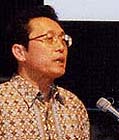 Outline of the Keynote Personal 1
Outline of the Keynote Personal 1

- Yuji Kawaguchi
-
- Director, WHO Centre for Health Development
As we enter the 21st century, what is particularly striking is the worldwide attention to woman values. Amid such major social fluctuations as the shift from heavy to light industry - the shift from manufacturing large, heavy products, to light, slim products - from centralized power to decentralization of the same, achieving symbiotic coexistence between people and nature has been called more seriously into question than ever before.
However, even though the alarm has been sounding on global environmental issues from as far back as almost 40 years ago, it seems that the human race will simply not respond unless the situation becomes grave enough to endanger human lives and health. We need to rethink the environment as our living environment, and address issues close to home at the local level, which in turn will contribute to resolving global-scale environmental issues.
Solid evidence-based research needs to be conducted to produce data revealing the impact that the environment has on human health.
A serious population explosion, a graying society, and high concentrations of population have brought 21st century Asia to a critical point.
The WHO Kobe Centre is pursuing global research activities focused in particular on cities and health problems, and I believe that the following steps will be key in resolving global environmental issues in the years ahead.Firstly, universities, research institutes, private sector and public institutions must work together to take an interdisciplinary approach that utilizes their respective strengths. Next, governments must engage in policy-making based on sound evidence-based data. Finally, communities must give attention to resolution of environmental issues at local level, which need to be recognized afresh as authorized decentralized regional organizations.






